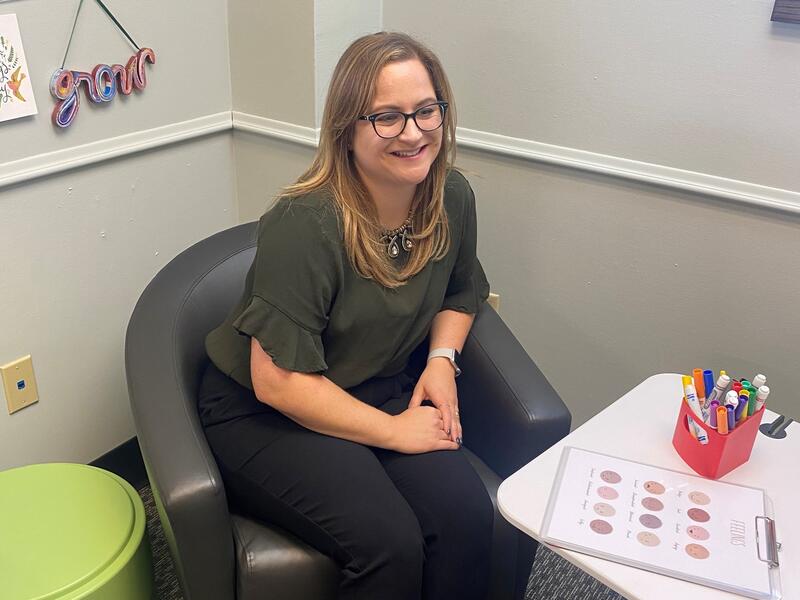Defining trauma and understanding its symptoms are unique to the individuals dealing with it. The important thing is that there are people trained to help you get through it.
Sanford Health’s Traumatic Stress Treatment Center in Fargo, North Dakota, has staff in place to offer a collaborative team approach that includes psychologists, counselors, social workers, pediatricians, psychiatrists and nurse practitioners.
Traumatic Stress Treatment Center clinical director Nicola Herting, Ph. D., is a Sanford psychologist who specializes in diagnosing and treating traumatic stress. She is a big part of that collaborative effort. Among her key messages is that the definition of “trauma” applies to a wide variety of circumstances.
What is traumatic stress?
“I think about trauma as being a scary, dangerous, violent event that can happen to anyone,” Dr. Herting said. “Whether it’s the sudden loss of a loved one, whether it’s an accident, whether it’s abuse, our center is focused on helping those impacted by trauma heal and build resilience.”
In a medical context, trauma is primarily associated with a physical accident. Within a behavioral health context, trauma and traumatic stress can include physical or sexual abuse, domestic violence and traumatic loss.
Recovering from a potentially traumatic event is a process that starts and resolves naturally for many. However, it can be a difficult journey to recovery and seeking more help and support from trained providers is important.
To that end, Dr. Herting and her colleagues are trained in a variety of evidence-based trauma treatments. For instance, Child and Family Trauma Stress Intervention (CFTSI) is offered immediately after a traumatic event to intervene before an individual develops post-traumatic stress disorder (PTSD) that can affect every day functioning. Trauma-Focused Cognitive Behavioral Therapy (TF-CBT) and Cognitive Processing Therapy (CPT) are provided to treat trauma symptoms and PTSD.
“Whenever trauma happens, the most important thing is that the child or adult has a supportive person in their life so that they don’t feel alone,” Dr. Herting said. “For children, a lot of times that is a role served by a caregiver, someone who knows when the child isn’t doing well.”
Recovering from trauma
The treatment center staff supports caregivers and teaches strategies and coping skills for when things aren’t going well. Building those strategies can help a child and a family avoid being overwhelmed to the point where it affects the body, mind and ability to cope.
“When you look at the different treatments we provide, the common denominator is having adequate support and adequate coping strategies that help individuals make sense of what happened,” Dr. Herting said. “What do I believe about what happened and the impact of what happened? How do I not avoid acknowledging what happened? Very often what trauma does is make us want to pretend it didn’t happen and then never talk about it.”
In short, patients learn how the mind and body works and how they affect thoughts, feelings, and actions. At the center, patients learn how to process what has happened and engage in healthy coping skills.
The center offers a variety of services to children, adults, and families, including:
- Outpatient care. Sanford’s evidence-based and trauma-informed assessments and treatment help children, adults and families who have experienced trauma.
- Culturally enhanced trauma treatments for American Indian populations. Sanford offers culturally sensitive and enhanced traumatic stress treatments to Native American children and their families, using protocols and guidelines specifically designed for Native American, Alaskan Native and Indigenous children and their families.
- Expert testimony in court cases. Sanford providers can fill the role of expert witnesses.
- Hospital consultations. Sanford specialists help hospital-based teams provide high-quality care to patients who experienced a traumatic event.
- Community education and outreach. The center works within the community to educate people on the realities of trauma and trauma treatments.
Virtual care available
The Traumatic Stress Treatment Center has proven to fill a great need in the region, particularly with the presence of the pandemic. The staff’s work in developing its telehealth capacities prior to the onset of COVID-19 enabled them to reach more people in need of care.
“Imagine coming in for therapy once a week and needing to travel three hours each way,” Dr. Herting said. “I’m very proud of our ability to learn from the research that was happening prior to COVID in terms of trauma treatment and utilize it when our patients needed it.”
The Traumatic Stress Treatment Center was born out of a collaboration with the Center for Biobehavioral Research in Fargo, Sanford Fargo Behavioral Health, Sanford Children’s CARE Clinic, and the Red River Children’s Advocacy Center.
“When you have multiple departments and community organizations coming together, that’s when you can make a huge difference,” Dr. Herting said. “I’m really excited about this partnership and what it means for our community, the surrounding area and the region as a whole.”
Learn more
- Parenting tips: How to talk tragedies with your kids
- Specially trained nurses help to heal victims of assault
- Practicing resilience helps with challenges like pandemic
…
Posted In Behavioral Health, Fargo, Leadership in Health Care, Research, Rural Health, Virtual Care
